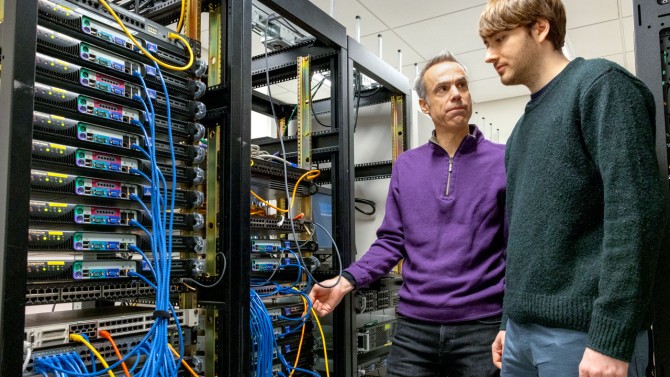
The Compact Muon Solenoid detector in Switzerland.
Cornell takes role in advancing software at CERN
By Rick Ryan
Cornell, in collaboration with other U.S. universities, has been awarded $25 million from the National Science Foundation (NSF) for another five years of research at the Large Hadron Collider (LHC) at CERN in Switzerland.
The funds support the Institute for Research and Innovation in Software for High Energy Physics (IRIS-HEP), which was launched in 2018 to tackle massive amounts of data coming from the Compact Muon Solenoid (CMS) detector at CERN.
Cornell is currently leading an upgrade to the CMS detector. The luminosity – or number of particle collisions – achieved will increase dramatically with the upgrade, necessitating an improved data collection process.
Researchers currently collect nearly 20 petabytes of data annually at the CMS detector, roughly equivalent to the complete digital collection held by the Library of Congress. The upgrade project will enable researchers to collect 10 times as much data, while also adding new detector capabilities.
IRIS-HEP focuses on enhancing the software infrastructure necessary for collecting and analyzing data from the LHC.
Peter Wittich, professor of physics in the College of Arts and Sciences (A&S) and director of the Laboratory of Elementary Particle Physics, is a lead researcher on the IRIS-HEP project. “This award is the software equivalent of the physical CMS upgrade,” said Wittich. “In order for the HL-LHC to be successful, the software systems need to have a similar focus as the detector upgrade. IRIS-HEP plays that role.”
Cornell, in collaboration with the University of California, San Diego, and Princeton, was first to recognize the need for a comprehensive program to update software, ensuring peak performance. The collaboration predates the IRIS-HEP award, where Cornell has a long-standing commitment to advancing high-energy physics software.
Wittich said the software that performs trajectory reconstruction, including the software used to discover the Higgs boson particle, is already a computationally intensive task and will only grow in complexity as luminosity increases.
“Modern processors are super smart and super complicated,” Wittich said. “In addition to being experts in algorithms, physicists need to think about the hardware that the algorithms run on. We have recognized the need take full advantage of the new computer hardware, as the data quantity will increase most dramatically in the transition to high luminosity.”
The group’s main goal is to get the software integrated into the running experiment at CMS and continue development of a new algorithm specifically for the detector – designed to run on massively parallel hardware allowing researchers across the world to analyze data.
This award builds on a previous Physics at the Information Frontier (PIF) grant awarded to Cornell’s group.
The project team includes Steve Lantz from the Center for Advanced Computing and Dan Riley from the Cornell Laboratory for Accelerator-based Sciences and Education – along with doctoral student Gavin Niendorf, Michael (Tres) Reid, Ph.D. ’23, and Kevin McDermott, M.S. ’16, Ph.D. ’19, who have received training beyond high-energy physics.
As Cornell continues to advance the CMS detector and the HEP software through IRIS-HEP, educational opportunities abound, Wittich said. “This platform allows students to engage in cutting-edge research,” he said, “and gain hands-on experience at the world’s largest, most multidisciplinary and collaborative science experiment.”
Rick Ryan is a science communicator for the Cornell Laboratory for Accelerator-based ScienceS and Education (CLASSE).
Media Contact
Get Cornell news delivered right to your inbox.
Subscribe

